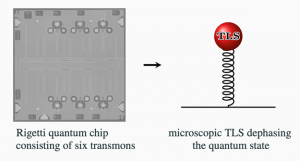Powering the Next Generation of Quantum Technology
UConn scientists and engineers are poised to contribute important research to a project designed to remove the microscopic defects that hinder development of quantum technology.
In April, the Air Force Office of Scientific Research (AFOSR) awarded Rigetti Computing and its research partners a $5.48 million grant to further develop chip fabrication technology. The project seeks to address the defects in superconducting qubits – the basic units of quantum information – through the development of state-of-the-art materials.
“Researchers are just beginning to realize the expansive impact that quantum technology represents,” says Pamir Alpay, UConn’s Vice President for Research, Innovation, and Entrepreneurship. “Understanding properties of materials at the electronic and atomic levels is critical to developing this revolutionary technology. UConn’s world-class scientists and engineers are going to play an important role in this research, exemplifying Connecticut’s commitment to advancing quantum science and its many applications.”
UConn is an important member of the consortium, which includes Rigetti, Iowa State University, the Royal Melbourne Institute of Technology, and the Lawrence Livermore National Laboratory. The interdisciplinary and international project underscores the importance of academic collaboration with private industry.
UConn Physics and IMS Prof. Alexander Balatsky, a condensed matter theorist focused on next-generation quantum technology, leads a team working to isolate, control, and eradicate two-level system (TLS) defects from contemporary quantum devices. The team will focus on cutting-edge quantum material modeling and will use supercomputers to simulate how TLS defects form and behave at the atomic level. Research will take place at the Institute for Materials Science.
“UConn is positioning itself as a key hub for quantum materials and quantum technologies research. The goal isn’t just to keep pace – it’s to lead,” Balatsky says.

TLS defects pose a major challenge to quantum technology. According to the UConn team, qubits rely on clean materials to stabilize delicate quantum correlations. Such materials are impossible to realize in the real world. The materials defects disrupt fragile quantum states that the qubits require.
“Just as it’s difficult to hold a conversation in a crowded room due to background conversations, TLSs create a kind of noise that drowns out quantum behavior,” says Balatsky.
The team says that for decades, TLSs were considered permanent flaws inherent to underlying material that were impossible to remove or control in building a quantum device. Rigetti, a Bay Area-based quantum computing company, disproved TLS permanence in a landmark 2024 study.
David Pappas, Rigetti’s senior principal scientist, led the study that introduced a novel technique called Alternating-Bias Assisting Annealing (ABAA). Through the application of precise electric pulses, the team reduced TLS disruption, proving that the disruptions could be mitigated.
Given the enormous potential of quantum technology across many different fields and industries, the ABAA discovery ignited a storm of interest across the globe. The team that learns how to improve materials for qubits will enable a major advance in the field. The AFOSR funding seeks to help address the next challenge as researchers try to understand the physics behind TLSs and develop materials that minimize impact.
“Rigetti is excited to work with experts at University of Connecticut to understand the fundamental materials science and physics of Josephson tunnel junctions,” says Pappas. “This collaboration will greatly enhance our ability to leverage this technique to scale superconducting quantum computers.”
The Josephson tunnel junctions are oxide barriers important in the ABAA process. According to Rigetti’s press release, ABAA entails applying a series of low-voltage pulses at room temperature to the junctions. The technique enables qubit frequencies to be precisely targeted prior to microchip packaging, improving scalability of the technology.
“This project gives us access to the resources and expertise to unlock the full potential of ABAA and gain a foundational understanding of defects in superconducting qubits,” says Dr. Subodh Kulkarni, Rigetti CEO, via Rigetti’s press release. “We already know that superconducting qubits have advantages in speed and scalability. Deepening our knowledge of superconducting qubit defects puts us in an even better position to scale our systems with improved performance.”
UConn has prioritized research into quantum technology and its impact in transforming Connecticut’s economy. Along the with Yale, UConn leads the statewide QuantumCT consortium, a largescale partnership with government and industry to convert Connecticut into the nation’s leading quantum accelerator.
“The future potential of quantum hinges on engineering ultra-stable materials which can withstand the devastating effects of TLSs,” says Balatsky. “It’s like the early days of semiconductors. We don’t yet know which materials or designs will dominate quantum tech. But materials research is the foundation—without it, the entire stack collapses.”
Latest UConn Today
- School of Nursing Class of 2025, Reflects on Their Time as a HuskyQ&A with graduating senior Tobias Fraedrich
- School of Nursing Class of 2025, Reflects on Their Time as a HuskyQ&A with graduating senior Samuel Geisler
- Congratulations Class of 2025Commencement is more than a ceremony—it’s a defining moment
- Winners of Faculty Spotlight Spring 2025 AwardsUConn School of Medicine Honors its Faculty Members Yulan Xiong, Caleb Battersby, and Audrey Chapman
- School of Nursing Class of 2025, Reflects on Their Time as a HuskyQ&A with graduating senior Allison Villano
- The Last FourInspiring. Impactful. Unforgettable.













